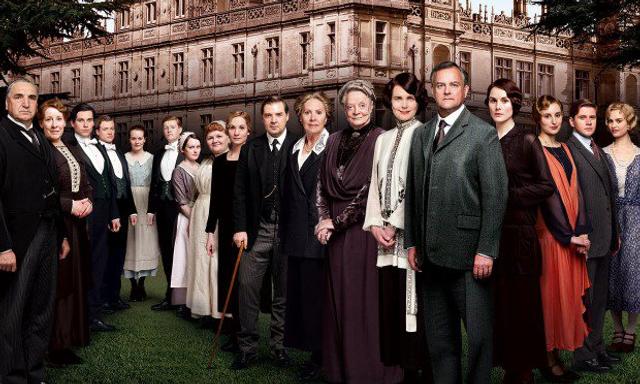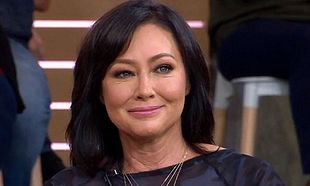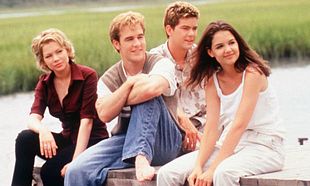When viewers in the UK and Ireland sat down to watch Downton Abbey on Sunday evening they were greeted with a warning about "violent scenes" that some might find distressing. Needless to say that didn't prepare them for what was to come at the end of your average hour at the 'Big House'.
SPOILER ALERT: If you're planning to watch Downton Abbey on TV3 this evening we suggest you look away now and return to this here article some time after 10pm.

Twitter, Facebook and almost every online publication has been inundated with comments and articles about the shocking scenes, which featured everyone's favourite Lady's Maid, Anna Bates, being brutally attacked by visiting valet Mr Green. The rape itself was only hinted at (Anna spurned the formerly friendly chap's advances so he hit her across the face before dragging her into another room and proceeding to attack her, while the cameras quickly cut to outside shots of the room and scenes featuring Dame Kiri Te Kanawa singing above stairs) but as the sounds of Anna's screams echoed through the servant's corridors, Julian Fellowes' fans recoiled in abject horror on their sofas.
Some might say it was evident from the beginning of the episode (that warning about violent scenes coupled with Green's overly friendly antics towards Mrs Bates made it rather easy to put two and two together) but even the most observant viewer easily found themselves silently mouthing no as he cornered her below stairs. The juxtaposition of her desperate screams with Dame Te Kanawa's beautifully shrill singing made the whole thing even more unsettling to watch. Those watching could have been forgiven for feeling as though they'd somehow wandered over to RTE One's Love/Hate by accident.
Since the episode aired on Sunday evening everyone from The Daily Mail to The Telegraph and the British viewing public have been complaining about Fellowes' decision to include a, and I quote, 'gratuitious' rape scene in a show they deem to be a 'family drama'. They've gone as far as to label the story 'sick and sensationalist', and both broadcast watchdog Ofcom and ITV have confirmed that they have received a number of viewer complaints.
Of course they have a point: Nobody really expects sexual violence at Downton Abbey. However, that doesn't necessarily mean that the storyline was sick and/or sensationalist. In fact, as several scholars have pointed out, sexual violence below stairs was rather prevalent at the time, and women had little option but to put up and shut up.
"It’s all too realistic a situation,” Dr Pam Cox (a social historian at Essex University who presented last year’s BBC series Servants - The True Story of Life Below Stairs) told The Telegraph. “Female servants were raped, abused and harassed. There was a hierarchy within the servants’ hall and butlers and valets were in a position of power... And in the early 20th century men had huge power over women - as is reflected in other Downton storylines like Mary’s inability to run the estate. As to whether a servant like Anna would have reported such an attack, it was extremely common not to. If we see women in the 1970s only coming forward now in the light of the Jimmy Savile inquiry, what does that mean for women decades earlier?"
Some viewers argued that it was 'morally reprehensible' for Fellowes to feature a sexual attack in a show like Downton Abbey: Others said the show was a family drama, which definitely shouldn't feature such 'explicit' violence, despite the fact that much of what happened was inferred rather than shown. Now I don't know about you, but I'm not sure we're watching the same show. I wouldn't be putting Downton Abbey in the same category as Seventh Heaven, for example.
To date we've witnessed a variety of shocking scenes: Mr Pamuk preparing to take Mary's virtue before promptly expiring in her chambers during an ad break, Ms O'Brien placing a bar of soap on the floor so as to cause Cora harm and subsequently causing her miscarriage, Thomas shooting himself in the hand to get out of the trenches, a desperately depressed soldier taking his own life, William and Lavinia meeting their maker, Sybil's rather distressing final moments and Matthew's awful car crash. As with the attack these things all happened mostly off screen but, it seems as though this time, something was different.
There are those out there who will argue that the storyline was the issue, that Fellowes went for the easy target in an attempt to boost the ratings of a show that was starting to fade. However, anyone who is familiar with his previous work (Gosford Park for example) will know that he had a track record for at least hinting at issues that were very topical at the time.
Joanne Froggatt, who played out those distressing scenes with former EastEnders star Nigel Harman, has spoken out about the plot and hit back at those criticising what they saw on Sunday evening. "I was really proud of the show for tackling a subject like this. It's a really brave thing to do and I really do believe that Julian's written that in a way that is not gratuitous at all, he does very much go on to explore the emotional journey of Anna and Bates. He's done a beautiful job of hitting the right note with it. I think we all just felt a big responsibility to get it right," she said during an interview on BBC One's Breakfast.
"Julian, and this is a credit to him, was adamant that we wouldn't depict that kind of violence against a woman on the screen and that's something that he didn't want in a show of his, that he's a part of, and that's an incredible thing in this industry in this day and age," she said. Harman also defended the shocking twist during an appearance on ITV's This Morning. "It was a shocking and bold storyline, and something that when I was sent the script and read it was, like, amazed and excited by it, if that makes sense, because for a show like Downton it really leaped out as a bold and risky idea" he said. "I'd worked with Joanne Froggat and Brendan Coyle before and we had a rehearsal and went for it."
As many critics have pointed out Downton Abbey is by no means the first period drama to tackle the issue, so why did the viewers balk at the idea of a sexual attack happening below stairs? Perhaps the best answer to that question can be found by looking to the real-life lady of Highclere. RadioTimes.com asked Lady Carnarvon what she made of Fellowes decision to depict a sexual attack in her home and she had this to say: "I’d imagine that Julian’s exploring different storylines and exploring darker themes as well and that’s completely his choice and he will also watch the reaction to see where he takes stories in the future".
They went on to ask about her own taste in television, and her answer offers up an interesting insight as to where it may all have gone 'wrong'. "I prefer looking at nice things on Sunday night but that’s just me", Lady Carnarvon explained, "I like the Cinderella stories, Pretty Woman, Notting Hill - all the nice things in life, particularly on a Sunday evening." So too do the Downton Abbey viewers who ended up complaining about the episode.
Fellowes biggest 'crime' wasn't depicting rape, and he certainly didn't do it in a disgustingly gratuitous manner. Sunday night's scenes may have made for uncomfortable viewing, but who on earth would say sexual violence was easy to think about, let alone watch in the first place? Issues such as these should be talked about and I, like many viewers, was rather confused when UTV failed to add a message or contact detail for those who may have been affected by what they had just seen.
I don't think those scenes, shocking and upsetting as they were, warranted the amount of backlash they've received: The real question, in my opinion anyway, is whether or not they'll deal with the aftermath of the attack without branching out into cheap sensationalism. "The complex and loving journey of Anna and Bates has been central to the narrative of the show. The events in episode three were we believe acted and directed with great sensitivity", a spokesman for the show said yesterday. "Viewers will see in the forthcoming episodes how Anna and Bates struggle to come to terms with what has happened."
If there's one thing Mr Fellowes is guilty of it's missing the mark with a large proportion of his viewers, ie the people like Lady Carnarvon who prefer to watch "all the nice things in life" of a Sunday evening. They'd rather he left issues like rape to the likes of Love/Hate, instead of bringing 'grit' to a somewhat pantomime period drama.
That's just their opinion, and there's absolutely nothing wrong with it.
If you or someone you know has been affected by the issues raised in the scenes mentioned above support and information is available at Rape Crisis Network Ireland









































































